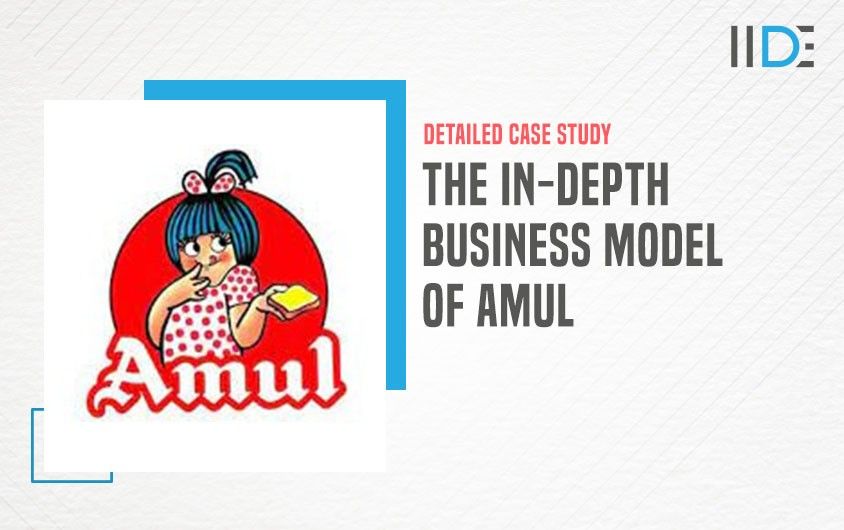About Amul
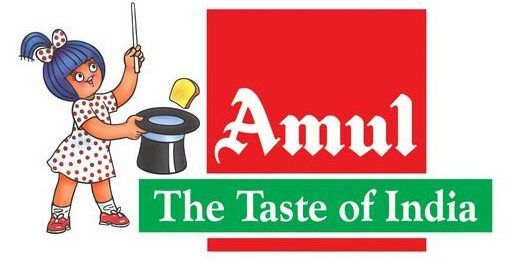
Source: Google
Amul, founded in 1946 by Tribhuvandas Patel, is a leading dairy cooperative in India with a mission to empower farmers through cooperative efforts, ensuring fair prices and sustainable livelihoods. Key milestones in Amul’s growth include the launch of Amul Butter and the iconic ‘Amul Girl’ advertising campaign, which is now a significant part of Indian culture. With a network of over 3.6 million milk producers, Amul is synonymous with quality and innovation in the dairy industry.
Amul’s business model primarily focuses on providing top-quality dairy products globally, contributing to its outstanding reputation. The success story of Amul is both, attractive and unique. Today, Amul is the first brand that comes to mind when thinking of ice cream, milk, cheese, butter, or any dairy product. One of the key reasons for Amul’s success is its commitment to innovation at every step.
Updated Statistics
- Revenue (2023): ₹50,000 crore (Source: Amul Annual Report)
- Market Share: 40% of the organised dairy market in India (Source: Statista)
- Milk Collection: 25 million litres per day (Source: Amul Corporate)
- Export: Products exported to over 50 countries (Source: Amul Corporate)
Business Model of Amul
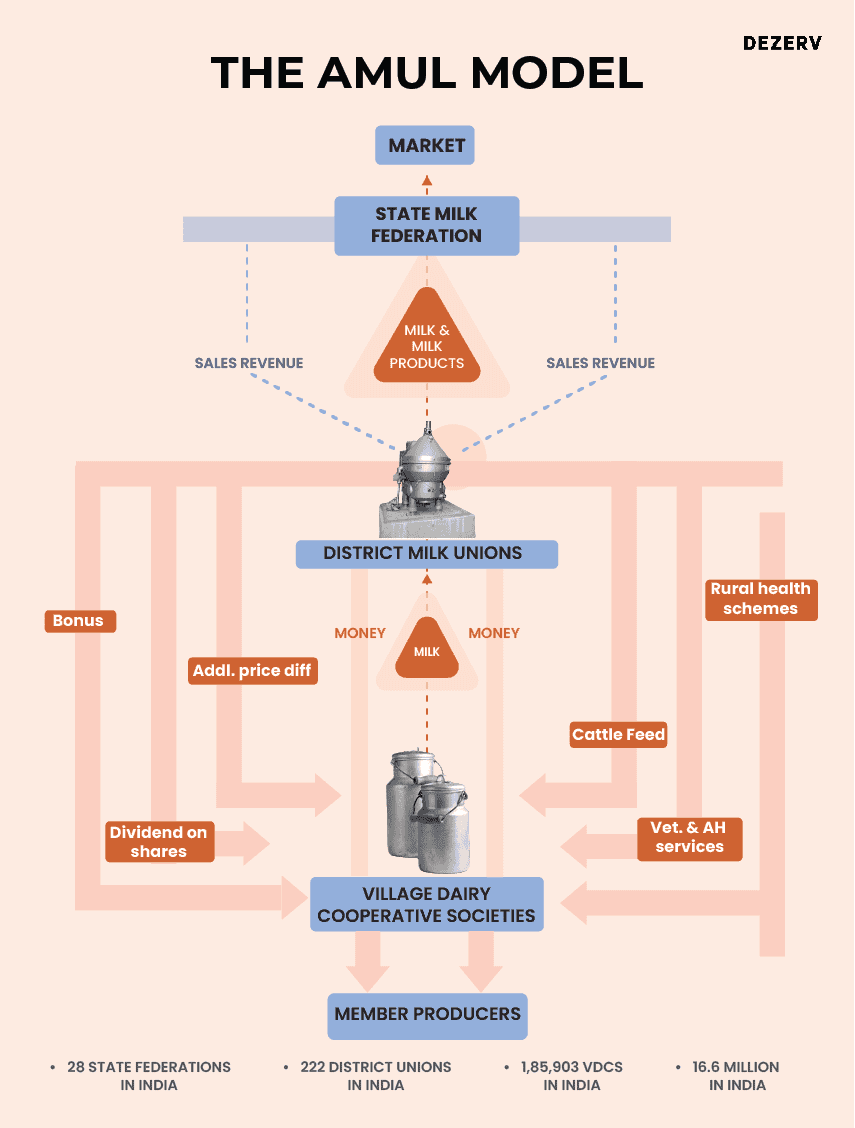
Source: dezerv.in
The Amul business model is structured around a cooperative society model, where individuals join forces and pool resources to achieve market growth. These individuals, who are members of this society, manage the finances, resources, and operations collectively. The business model of Amul prioritises affordable prices for consumers while safeguarding the interests of farmers. Let’s explore the details of this model.
First Tier – The first tier comprises farmers from various villages who are part of the Village Dairy Cooperative Society. Each village in a State selects representatives to advocate for their village at the District Milk Unions. The Village Dairy Cooperative Society forms the foundation of the Amul model.
Second Tier – The second tier includes the representatives chosen by the Village Society. These representatives jointly manage the District Milk Union. This union oversees the creation of milk and milk products, ensuring their processing before selling them to the State Milk Federation.
Third Tier – The third tier is the State Milk Federation. This Federation sells the processed products received from the District Milk Union, acting as a distributor and facilitating market sales. The revenue generated is distributed downward through the tiers.
Understanding the Amul cooperative model provides insight into its effectiveness and success. The model ensures that benefits trickle down from the market to the producers, who are at the base of the pyramid.
Before we delve into the business model of Amul, we have a recommendation for those seeking to master digital marketing. If you’ve been struggling to find the perfect resource, we suggest checking out these digital marketing classes.You might just find the perfect fit for your needs.
But if you’re unsure where to begin? Consider attending a free digital marketing certification. This can be a great way to explore the world of digital marketing and see if it aligns with your interests.
1. Amul’s Business Model: Market Share & Analysis
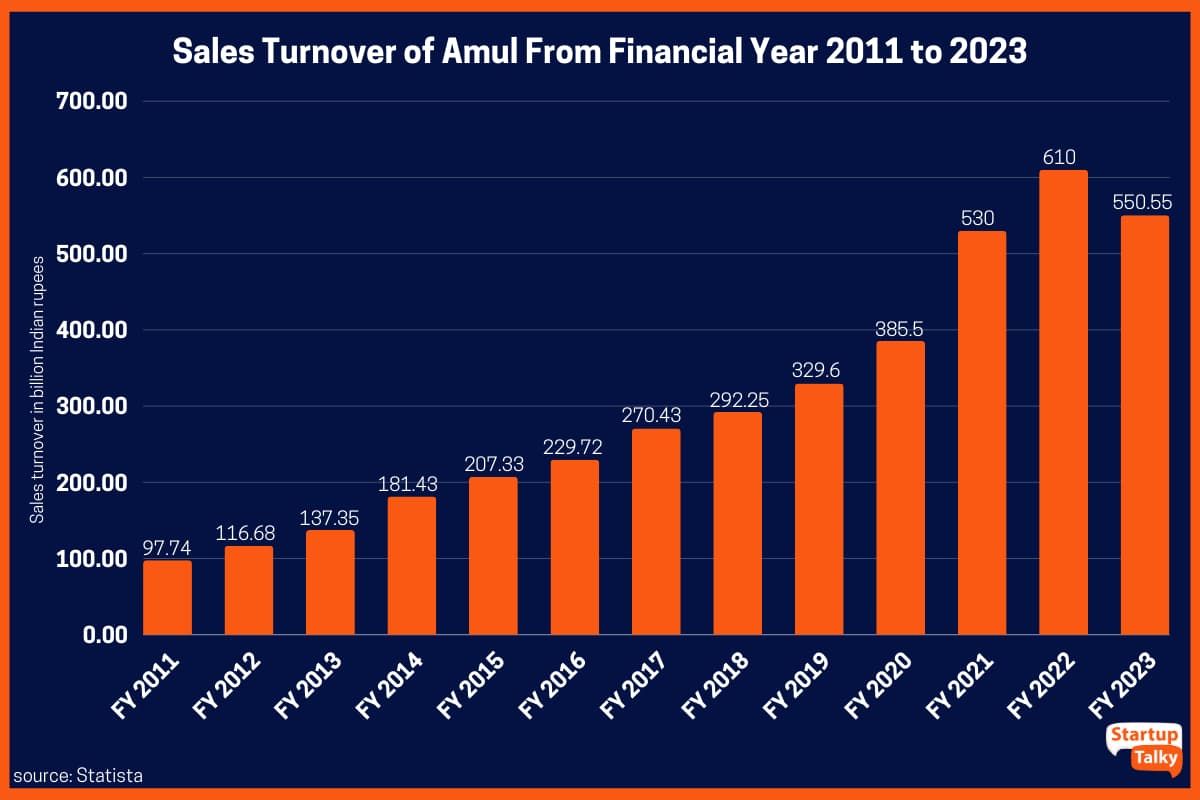
Source: startuptalky.com
Amul dominates the organised dairy market in India with a 40% market share, reflecting its strong presence and consumer trust. The brand’s extensive distribution network and strategic marketing have enabled it to maintain a competitive edge. The overall success is attributed to Amul’s cooperative model which aggregates milk from millions of small farmers, ensuring a steady supply and fair pricing. Market analysis reveals that Amul’s continuous innovation and expansion into new product categories have fortified its market position, making it a leader in the dairy sector. Understanding the business model of Amul provides insights into how Amul works and its effective functioning.
2. Amul’s Business Model: Product Offerings
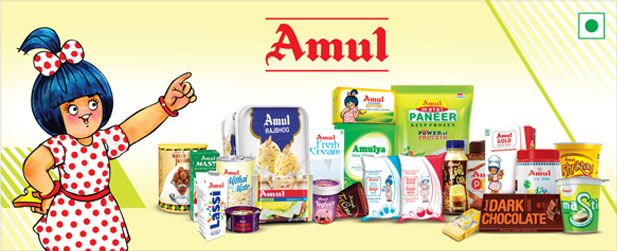
Source: Google
Amul’s product portfolio boasts a wide range of dairy products, including milk, butter, cheese, yoghurt, ice cream, and milk-based beverages. The brand has also ventured into non-dairy segments with products like chocolates and bakery items. Each product line is designed to cater to diverse consumer needs, from daily essentials to indulgent treats. The business model of Amul showcases its commitment to quality and innovation, ensuring that its products meet the highest standards. This dedication has helped it maintain consumer loyalty over the years.
3. Amul’s Business Model: Target Audience
Amul’s target audience spans across various demographics, including urban and rural consumers, health-conscious individuals, children, and families. The brand’s diverse product range caters to different age groups and lifestyles, making it a household name in India. Amul’s marketing strategies, such as the Amul Girl campaigns, resonate with a broad audience, enhancing its appeal across different segments. The Amul business model,demonstrates how Amul works effectively to meet the needs of its wide customer base.
Every successful business, whether a multinational corporation or a small startup, relies on understanding its target market. For instance, FMCG giants, beauty brands, and even digital marketing firms, all have specific target audiences they focus on to achieve success. To learn more about how these companies effectively define and target their audiences, consider exploring our courses on digital marketing online. These courses provide valuable insights into the strategies employed by industry leaders worldwide.
4. Funding & Investors
Amul operates on a cooperative model, where the primary funding comes from its member farmers. This cooperative structure ensures that profits are reinvested into the business or distributed among the members. The business model of Amul is self-sustaining, reducing dependency on external investors and fostering a sense of ownership among the members. This approach has been crucial to Amul’s growth and stability, making it a prime example of the Amul model of dairy development.
5. Functioning of Amul: Revenue Model
Amul’s revenue model is based on the sale of its extensive range of dairy and related products. The brand generates significant revenue from its domestic market and exports. Amul’s competitive pricing strategy, coupled with high-quality products, drives sales and market penetration. Additionally, the cooperative model ensures that a substantial portion of the revenue benefits the member farmers, promoting sustainability and growth.
6. Functioning of Amul: Marketing Strategy
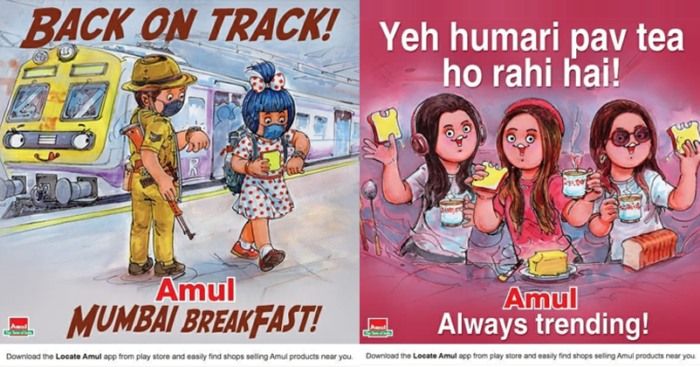
Source: Google
Amul’s marketing strategy is renowned for its creativity and consistency. The ‘Amul Girl’ campaign, with its witty and topical ads, has been a cornerstone of the brand’s marketing efforts. Amul utilises a mix of traditional and digital media to reach a broad audience. The brand’s focus on quality, innovation, and consumer engagement has made its marketing campaigns highly effective in building brand loyalty and driving sales.
We all know how successful and reputed Amul is. But do you know the reason behind this success? In this section, we will get to know the answer to this question and how Amul has maintained and continued a legacy for a very long time. The marketing strategies that helped the company gain success are grounded in the Amul’s cooperative model, which has played a crucial role in their achievements.
Amul has a very wide range of products catering to the needs of all age groups, genders, and professions. The list of products that Amul sells is Amul Milk, Bread spreads (Amul butter, Amul Lite, delicious table margarine, unsalted butter, garlic butter), Amul Cheese, Amul Beverages (Amul kool flavored milk, Amul Masti buttermilk), Amul Ice cream, and other dairy products.
Amul promotes all its products under one brand name, ‘AMUL’. This provides the company with better brand visibility and reduces its advertising costs. The reputation of the brand name has been impeccable through the decades and still, its reputation is similar to when Amul came into the market decades ago. The Amul model success story demonstrates how this unified branding strategy has significantly contributed to their enduring success.
As we saw, Amul caters its products to every segment of society, be it kids, adults, senior citizens, rich, poor, or all the segments of society. The business model of Amul has catered to different economic segments without any compromise on its products. Products that cover a huge market segment and are used daily are tried and provided at an affordable price without any compromise in the products, hence giving them an advantage over their competitors.
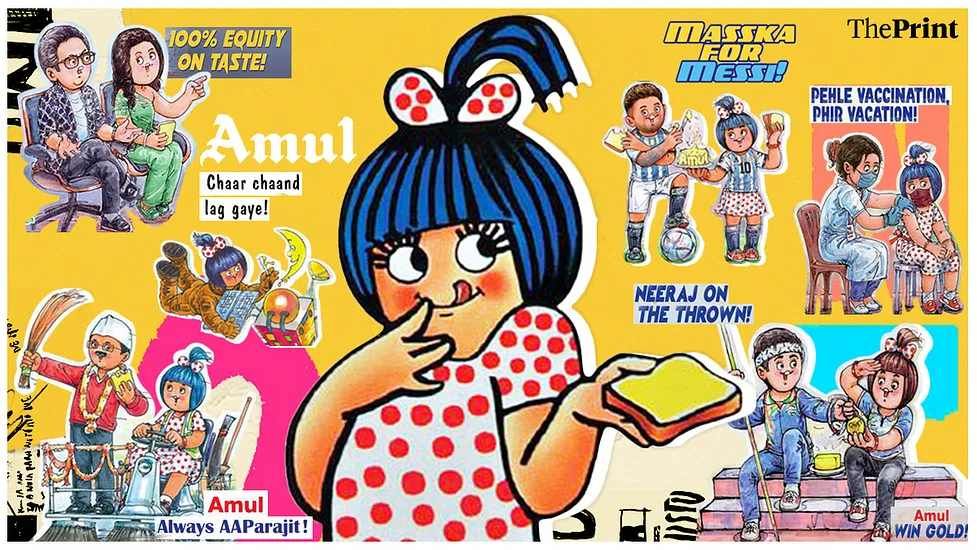
Source: Google
One of the biggest marketing strategies that helped Amul’s business model gain success is its advertising campaign. Amul got its name in the Guinness World Record for the longest-ever advertising campaign. The Amul-girl, the cartoon figure, is used by the company to promote its brand. Their advertisements are related to recent and trending events happening all over the world with a bit of sarcasm and humor.
Marketing plays a crucial role in any firm. In today’s fast-paced world, it’s essential to recognise how companies are rapidly advancing their digital strategies too. Digital marketing is not only shaping our future but has also become the top choice for many to pursue. If you’re eager to delve into the digital realm and considering higher studies, an MBA in Digital Marketing is precisely what you need. Trust me, it’s the perfect way to transform your career and break away from the mundane.
However, if you don’t have the time to commit to an MBA, a short-term course could be the perfect fit for you. You can study digital marketing online in a shorter span and still become job-ready for major firms. These courses provide the essential knowledge needed to bridge the gap between theory and practical learning effectively.
7. Campaigns of Amul
-
Amul Butter: The Taste of India:
This is Amul’s long-standing tagline, emphasising the brand’s strong association with Indian culture and taste preferences.
-
Utterly Butterly Delicious:
Another famous tagline that highlights the deliciousness of Amul butter.
-
Amul Doodh Peeta Hai India:
This campaign focused on the importance of milk consumption in India and positioned Amul as a symbol of quality milk products.
Amul’s campaigns for its ice cream range have also been popular, often showcasing its wide variety of flavors and the joy of consuming ice cream.
-
Women’s Empowerment and Social Issues:
Amul has also used its campaigns to address social issues and promote women’s empowerment, showcasing the Amul girl as a voice for change.
-
Festivals and Celebrations:
During various festivals and celebrations in India, Amul comes up with special campaign designs that reflect the festive spirit of the country.
PS: if you want to learn about blogs and not just case studies then this digital marketing blogs page might just be what you are looking for.
8. Examples of a Failed Campaign Or Backlash from Users
-
Amul Macho Controversy (2007)
Amul Macho is a brand of innerwear for men produced by Amul. In 2007, they launched a controversial advertising campaign that featured a muscular man wearing Amul Macho underwear and a tagline that read “Yeh Toh Bada Toing Hai” (This is very stimulating). The campaign was widely criticized for being in poor taste and objectifying women. Many felt that it was offensive and conveyed an inappropriate message. Amul faced backlash from various quarters, and the campaign had to be pulled.
-
Amul Kool: Are You Cool? (2005)
Amul Kool is a line of flavored milk products. In 2005, they ran an advertising campaign featuring a teenager who becomes “cool” after consuming Amul Kool. The campaign was criticized for its portrayal of peer pressure and the idea that one’s social status could be determined by consuming a specific product. It was seen as an attempt to exploit the insecurities of young consumers, and the campaign received negative feedback.
9. Business Model of Amul: Value Proposition
Amul’s value proposition lies in its commitment to quality, affordability, and innovation. The brand offers a wide range of high-quality dairy products at competitive prices, ensuring accessibility for all consumers. Amul’s cooperative model provides fair remuneration to farmers, enhancing their livelihoods. This combination of consumer and farmer-centric approaches has established Amul as a trusted and beloved brand in the dairy industry.
10. How Amul Works: Operational Model
Amul’s operational model is built on its cooperative structure, where millions of small farmers are organised into village-level cooperatives. Milk is collected from these cooperatives and processed at various dairy plants. The processed products are then distributed through an extensive network of distributors and retailers. This efficient supply chain ensures that fresh and high-quality products reach consumers promptly, maintaining Amul’s reputation for reliability and excellence.
11. Business Model of Amul: Strategic Alliances & Partnerships
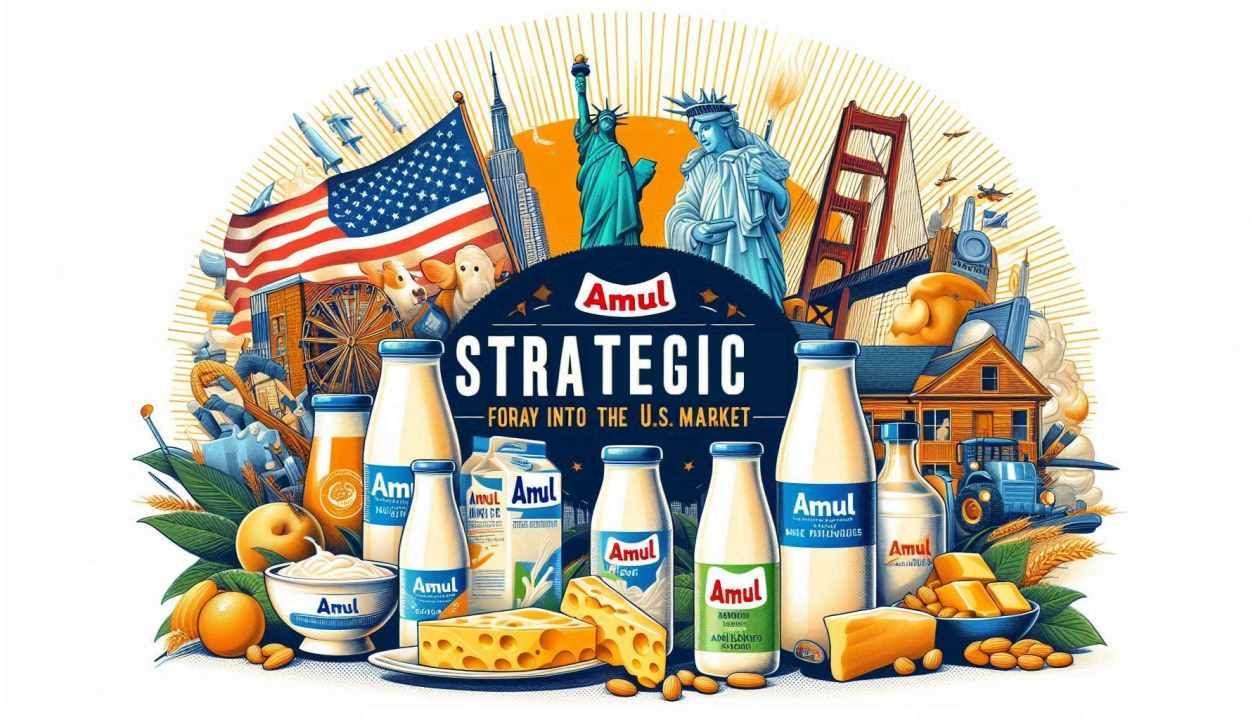
Source: Google
Amul has formed strategic alliances and partnerships to enhance its operational efficiency and market reach. Collaborations with technology providers have improved milk collection and processing. Partnerships with retailers and e-commerce platforms have expanded Amul’s distribution network. These alliances enable Amul to leverage external expertise and resources, driving innovation and growth.
12. How Amul Works: Technological Innovations
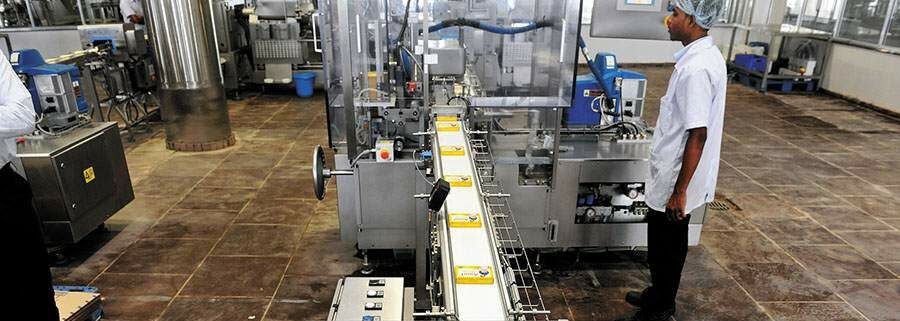
Source: Google
Amul leverages technology to enhance its operations and product offerings. Innovations such as automated milk collection units, quality testing equipment, and advanced processing technologies ensure high standards of quality and efficiency. Amul’s digital initiatives, including its mobile app and online platforms, provide consumers with convenient access to products and information, enhancing the overall customer experience.
Technology is the way to go for the future. When paired up with marketing skills and strategies it can bring incredible growth to any firm aspiring to become a unicorn. You can also learn how to create an impactful and targeted marketing campaign by being a part of a free top-paying skills course which will give you an idea of the rising digital marketing field.
Corporate Social Responsibility (CSR)
Amul’s CSR initiatives focus on sustainable development and community welfare. The Amul model invests in various programmes such as education, healthcare, and rural development. Amul’s environmental initiatives include promoting sustainable farming practices and reducing its carbon footprint. By prioritising social and environmental responsibilities, Amul’s model reinforces its commitment to holistic growth and community well-being.
Top Competitors
- Mother Dairy: A significant player in the Indian dairy market, known for its quality milk and dairy products. It operates a vast distribution network similar to Amul.
- Nestle: Nestlé is a global leader in nutrition, health, and wellness, renowned for its extensive range of dairy products. With a strong brand presence and a diverse product portfolio, Nestlé stands as a formidable competitor in the industry. Fortunately, we’ve covered everything about Nestlé in our comprehensive case study on the marketing mix of Nestlé. Be sure to check it out now.
- Britannia: Primarily known for its bakery products, Britannia also has a strong presence in the dairy segment with products like cheese and milk beverages.
- Parag Milk Foods: A prominent dairy company offering a range of products under brands like Gowardhan and Go Cheese. It competes with Amul in various product categories.
- Dairy Day: Known for its ice creams, Dairy Day competes with Amul in the frozen desserts segment, offering a variety of flavours and products.
